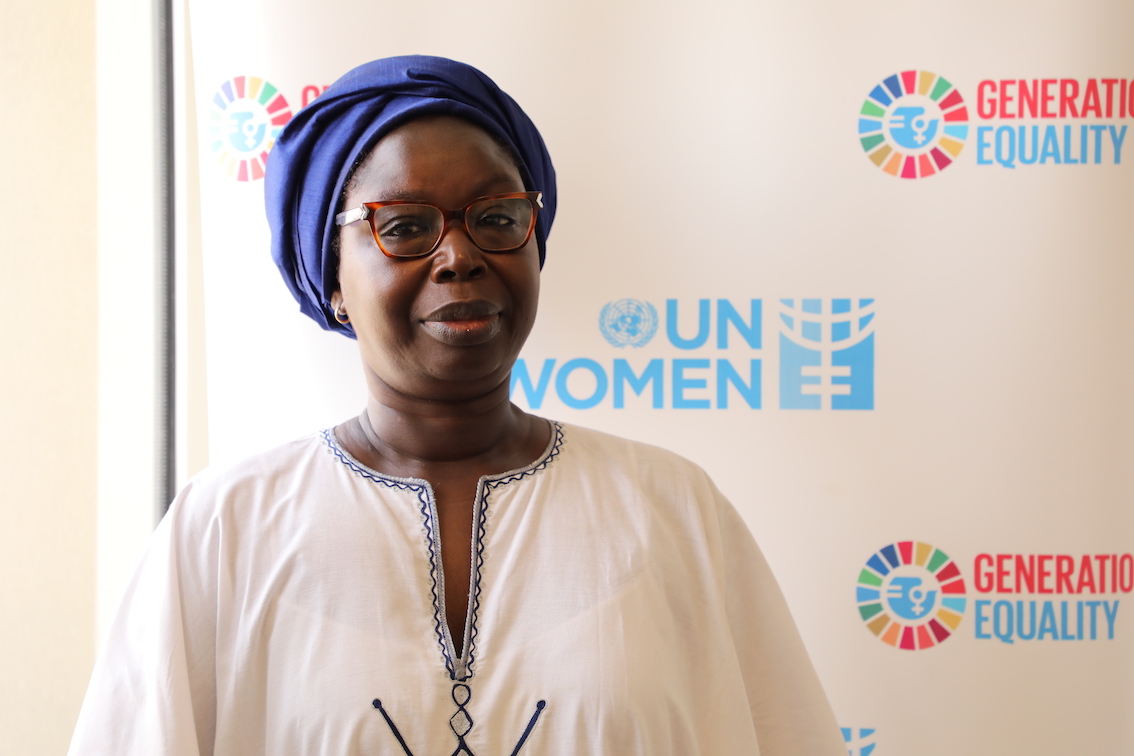Take Five interview with Adjaratou Ndiaye, UN Women Sudan Representative
Date:

A year since the outbreak of conflict in Sudan, UN Women is deeply concerned about the ongoing violence. It is having a devastating impact on the people of Sudan, particularly women and girls. The conflict has reversed the gains made toward democracy and stability, leaving the country in more insecurity and facing a humanitarian crisis.
The impact on women and girls has been particularly severe. Ahead of one-year mark of the conflict in Sudan, UN Women ESARO sat down with Adjaratou Ndiaye, UN Women Sudan Representative, to talk about the situation on the ground and UN Women’s response.
1. Can you briefly describe the current situation in Sudan?
As we approach the one-year mark of the conflict in Sudan, I want to express my deep empathy for the Sudanese people. The past year has been particularly challenging for Sudanese women and children, with the optimism sparked by the revolution dissipating after the 2021 military coup. We're witnessing a widespread and aggressive conflict leading to significant displacements and suffering. Sudanese people are facing multiple displacements, and the conflict is spreading into many different states. The situation has deteriorated, with the conflict affecting multiple states and complicating humanitarian responses and development programs aimed at ensuring the survival of the Sudanese people.
The security situation is dire. Tensions between the warring parties over humanitarian access exacerbate the challenges faced by the Sudanese.
I want to acknowledge the resilience of the Sudanese, particularly the women, as they continue to advocate for peace and democratic governance.
2. What impact has the conflict had on Sudanese women and girls?
Women and children have suffered immensely, facing displacement and exposure to conflict-related sexual violence and exploitation.
The conflict has led to significant losses, both materially and psychologically, destroying homes, memories, and access to essential services like education and healthcare. The disruption of the education system and lack of access to health services and livelihood opportunities have been devastating. Additionally, the war economy has halted investments in economic development, forcing women to depend on humanitarian aid instead of trade and agriculture.
Women have been vocal in advocating for an end to the conflict and have been instrumental in pushing for a gender and women's agenda in the peace process. Despite underreporting, the instances of SGBV are alarmingly high, emphasizing the need for accountability to ensure hope and reconciliation.
There's a critical need to make the humanitarian response gender-sensitive, as women and children, the primary beneficiaries of aid, face specific needs and risks, including sexual violence even within refugee camps.
3. How has UN Women been assisting women and girls in Sudan?
At the onset of the conflict, UN Women supported the establishment of a women's platform for peace to advocate for an end to the war and support humanitarian responses. We have also established situation rooms to support women and girls at risk of gender-based violence, delivered dignity kits and kitchenware and supported economic empowerment initiatives. We developed gender assessments to inform the humanitarian response and advocate for women's participation in peace processes at all levels. Despite the global context, we are striving to ensure that the conflict in Sudan does not become neglected, emphasizing the need for substantial investment to address the humanitarian crisis.
Field realities shows the pivotal role of women in delivering aid at the local level, they are the backbone of humanitarian work. Grassroots women's organizations play a significant role in providing humanitarian assistance due to their accuracy in information and statistics regarding beneficiaries, age groups, and specific needs. They have the capacity to engage and communicate with communities and enjoy more trust from local communities, and they need to be involved in the humanitarian work.
4. What are Sudanese women calling for?
Sudanese women are advocating for peace and for the necessary funding to protect the Sudanese people from all the difficulties that the conflict brought. Sudanese women want to be involved in all stages of humanitarian work. They are calling for providing financial support, especially for women who are heads of households, including widows, divorcees, and those with disabilities, to support economic activities for displaced and women in host communities, to integrate the sexual violence protocol to cover all women in Sudan, and provide psychological support and shelters to protect women who have experienced rape across Sudan and in refugee camps in neighboring countries. They are calling for empowering local and grassroots organizations to fulfil their roles, especially in emergencies and humanitarian work. In this regard, building the capacity of local and grassroots organizations, especially women's organizations in important.
5. What is your call to action for supporting women and girls in Sudan?
The international community must recognize the gravity of the situation in Sudan and not let it become a neglected conflict. Investing in livelihoods and protection against SGBV is critical, as is supporting peace processes and democratic governance.
The resilience of Sudanese women, their commitment to peace, and their demand for democratic governance should be at the forefront of international efforts.
Ensuring the protection of human rights activists and prioritizing the needs of Sudanese women is crucial for addressing the immense challenges faced by Sudanese women and girls.